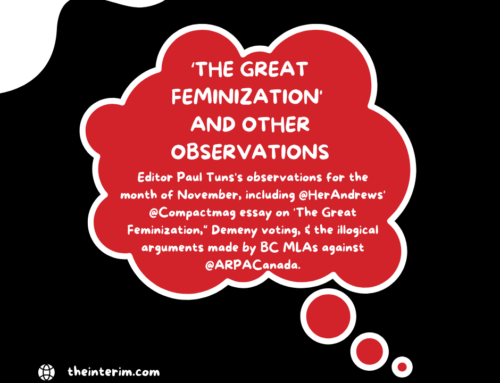Paul Tuns:
From the Editor’s Desk
As usual I will utilize this column to bring to your attention some stories that did not quite grow up to be full articles in the paper. Sometimes this is because of space or time limitations, sometimes because there is not much more to say about the topic. But it reminds me of something that Jim Hughes was asked about in the early days of the paper (some 38 years ago): is there is enough material for a monthly pro-life paper? Ideally, we would be bi-weekly — that is, every other week, not twice a week — to cover everything there is to write about. So here we go.
**
Biweekly is an interesting word; It means two very different things: every other week and twice a week. It does not matter if it is an adjective, adverb, or noun. Ditto for bimonthly. Biannual means twice a year while biennial means every two years, which is confusing when heard but not when it is read. It is possible to use semi-weekly or semi-monthly (or semi-annually) to mean twice a week, month or year. But that does not change the fact that the use of biweekly can still be ambiguous. Most people understand that a biweekly publication comes out every other week, although it can mean the magazine or newspaper comes out twice a week, although I cannot think of a single one that does that. Language is a funny thing.
**
Speaking of language, this, from the CNN website bothered me: “Singer Demi Lovato has revealed they are nonbinary and are changing their pronouns, telling fans they are ‘proud’ to make the change after ‘a lot of self-reflective work’.” I am not going to report on yet another publicity-seeking celebrity announcing to the world that they are changing their “gender” or refusing to accept their born sex. What more is to be said about these stories anymore? They are boring now, which is not to say they are unimportant, but as a friend messaged me when the story broke, “at some point it will be news when a celeb does not announce a new gender.” I understand the terrible influence these announcements have on impressionable youth who are being gaslighted that gender is fluid and unrelated to their biological sex. No, what I want to point out is the grating language: the singular they and their. I will never get used to seeing the singular they. I understand that Chaucer and Shakespeare used the singular they, as did Jane Austen as late as 1813. I understand language evolves. But language should evolve organically, and preferably without ideological goals.
**
Sohrab Ahmari, editor of the op-ed pages of the New York Post, tweeted sardonically, “Shouldn’t that be ‘have’ revealed, for consistency?” parenthetically adding, “That is, if we abide by by gender ideology’s grotesque and bizarre distortions of English grammar?”
**
I am agnostic about which is sillier, using they or them to describe a singular male or female or the made-up pronouns correctly denounced by Jordan Peterson: ze, zee, zir, zem, and zeir. Thankfully these monstrosities have yet to catch on.
**
Robert Batherson is the president of the Conservative Party of Canada. His Twitter account does not provide that important biographical detail. Instead, it informs us: “Business person, community volunteer, husband, father, son (he/him).” What kind of “conservative” has pronouns in their bio?
**
Writing about which pronouns to use to refer to Bruce Jenner, who now goes by the name Kaitlyn and is considering running as a Republican for governor of California, National Review’s Jay Nordlinger says “Language is a minefield.” Indeed. Blogger Glenn Harlan Reynolds says that the Left is constantly changing language rules, not merely to change the way we think about things but as a power move in which those who are not au courant of proper usage are forced to be on the defensive, or at the very least look like out-of-touch fogeys. Nordlinger writes, “One of the reasons I rejected the Left, long ago, was that they were always telling you how to talk. They were always saying what you could say and not say. They were language cops.” I highly recommend a 2014 National Review essay by Nordlinger, “Adventures in Lexical Fashion: Today’s progressive term may become tomorrow’s slur.”
**
The Daily Telegraph reported that the London North Eastern Railway (LNER) in the United Kingdom has told its conductors to avoid using the greeting “ladies and gentlemen” following a single complaint from a non-binary passenger. LNER has said its conductors will be warned to not use this greeting anymore following a complaint from a “laurence” (sic), a non-binary passenger. (First there is an assault on the clear meaning of pronouns, and then there’s the attack on the proper use of capitalization.) That complaint, by the way, was made on Twitter, when a passenger wrote, “’Good afternoon ladies and gentlemen, boys and girls …’ As a non-binary person this announcement doesn’t actually apply to me, so I won’t listen.” This person was being troublous; there is no way that he (not they, ze or zee) did not know that the announcement was meant for all riders of the train. A spokesman responded with the expected obsequiousness, that the LNER agreed that train managers “should not be using language like this.” Note Glenn Harlan Reynolds’ comments in the previous item.
**
Last month, Jay Nordlinger also had a National Review column in which he addressed the divorce of Bill and Melinda Gates. Their support of population control is well-worn ground and it was disappointing to see that they will continue to co-run the Bill and Melinda Gates Foundation which funds all sorts of mischief. Nordlinger provided a refreshing take on the public aspect of this personal issue. “Divorce is a contagion,” wrote Nordlinger. “Everybody wants to get in on the act. It is an underrated evil, as I see it … A colleague of mine was saying not long ago that divorce, for a while, was considered rather glamorous. Racy. Now it’s as common as dirt.”
**
The CBC’s Eric Grenier had an article on the state broadcaster’s website, “How a vacancy in a safe Conservative seat could mean headaches for Erin O’Toole.” Grenier reports on the open seat in Haldimand–Norfolk in southwestern Ontario where Diane Finley has resigned. A by-election must be held within six months. Leslyn Lewis, the pro-life candidate who finished third in last summer’s Conservative Party leadership contest, has already been acclaimed as the party’s candidate in the “safe” Conservative seat. Grenier concedes “there are certainly lots of reasons for the Conservatives to welcome Lewis with open arms,” including her popularity with the base and proven track record of fundraising. Grenier states the obvious: “As a Black woman from Toronto, Lewis represents constituencies the Conservatives would like to reach.” But to the eyes of pundits like Grenier, there is a rub: “But as a social conservative, Lewis also represents a constituency that has held the Conservatives back in the past — particularly among younger women who live and vote in the urban and suburban parts of Canada that happen to decide elections. A new, prominent voice from the socially conservative wing of the party might not make reaching those voters easier.” I am willing to concede there is a chance that her social conservatism might turn off some voters, including those in other ridings, although it is more than likely such voters would not vote conservative anyway. The problem with Grenier’s “analysis” is that it is all conjecture. Unlike the United States and United Kingdom, there is a dearth of quality polling and survey data to truly understand voters. The fact is we have no idea whether Lewis would hurt the Conservatives “in other ridings,” although common-sense and experience suggests that voters do not give much weight to candidates in other ridings. I do not mean to pick on Grenier, for his is merely parroting a narrative taken as a given among the Parliamentary Press Gallery: that in the urban and suburban ridings that the Conservatives need to win the most seats, social conservatism is, to use a phrase, the stinking albatross around the party’s neck. It is a convenient story told by the pundit class — reporters, political strategists who populate panel shows, academics — that happens to nicely align with their own social liberalism. Again, it might be true. We just don’t know, and Grenier’s article, like most “analysis” making this point, is never backed up by facts.
**
Last month I closed this column noting the obituary of a wonderful matriarch who died leaving a legacy of more than 200 descendants. This month, I note a less heroic passing, that of Pat Bond, who died at the age of 94. Pat Bond was a foundational figure in the B.D.S.M. community. In 1970, he placed an ad in the pornographic magazine Screw: “Masochist? Happy? Is it curable? Does psychiatry help? Is a satisfactory life-style possible? There’s women’s lib, black lib, gay lib, etc. Isn’t it time we put something together?” Five people answered the ad but only two of them showed up at the inaugural meeting of The Eulenspiegel Society, America’s first sado-masochistic club for adherents of what is now much more inclusively known as the BDSM community (bondage, dominance, sadism and masochism). Within three decades, this particular form of fetish would become more mainstream with the cable show Kink, but it was revolutionary at the time — although its historical antecedents go back centuries, if not millennia. The New York Times obituary claims Bond “wasn’t looking for sex so much as community” and became a “foundational figure, applauded at conferences, noted in academic papers and hailed as an elder by those who shared his interest in role-playing sex.” Eventually the small group that met in Bond’s New York apartment grew, and the Society had a membership of more than a thousand people: “Every week, however, more and more people appeared: just masochists at first, but eventually sadists, too, were welcome.” I assumed such things were ying and yang, but originally the self-identified community did not necessarily think so. My favourite detail in the Times obituary came from Terry Kolb, a heterosexual woman who was one of the two guests at the first meeting, who said that Bond was an introvert. The Eulenspiegel Society — named after a character in German folklore identified by a protégé of Sigmund Freud as a symbol of masochism — eventually released a manifesto and spawned new groups. Their manifesto asserted, “the right to pursue joy and happiness in one’s own way, according to one’s evolving nature, as long as this doesn’t infringe on the similar happiness of others,” which sounds … very modern. Happiness unmoored from authentic truth and beauty is a form of slavery, which, I guess, might very well appeal to sadists and masochists.




